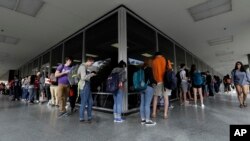Democrats in deep-red Texas voted in force in the first-in-the-nation 2018 primary elections Tuesday, propelling women candidates toward possible challenges to entrenched male Republicans in Congress and venting their midterm anger at President Donald Trump.
The biggest question was whether Texas is just the start of what's to come nationwide. Energized Texas Democrats appeared poised for their biggest turnout in a midterm primary in more than a decade, despite the long odds this November of ousting Republican U.S. Sen. Ted Cruz and other statewide officeholders who've fervently stood by Trump.
But with the GOP's majority in Congress on the line this fall, Democrats in Texas barreled out of the gates to vote. They showed up in bigger numbers than Republicans during voting before election day in Texas — the nation's biggest conservative state. Republicans retook the overall lead in turnout as results trickled in, but Democratic voting remained high.
Nationally, Democrats have their sights on flipping three GOP-controlled congressional seats in Texas that backed Hillary Clinton over Trump in 2016, including a Houston district where two women were the top vote-getters in early returns in a race likely to go to a May runoff.
Cruz and his Democratic challenger who has generated national excitement despite facing long odds, U.S. Rep. Beto O'Rourke, easily clinched their party nominations for the Senate. Meanwhile, several congressional races packed with candidates were expected to head to May runoffs. Republican Gov. Greg Abbott also cruised to his party's nomination for re-election.
The surge of Democratic voters included some former Republicans switching this cycle, including 61-year-old Sarah Chiodo of Dallas, who said she changed parties after Trump was elected.
"I hope that our political environment changes. I'm not happy with it today," she said after voting at a Dallas church. "I find it very divisive and dividing of many people and negative. So I'm looking to vote for people who are positive who care about all.''
Democratic early voting more than doubled that of the last non-presidential cycle in 2014, while the number of Republican early ballots cast increased only slightly. But after the polls closed, Republicans predictably regained a sizeable advantage in total votes cast.
Democrats haven't won any of Texas' 29 statewide offices since 1994, the nation's longest losing streak. That's expected to continue this cycle despite any possible "Trump effect" because Democrats fielded little-known candidates against top Republicans, such as Abbott and Lt. Gov. Dan Patrick. Even Attorney General Ken Paxton, who has been indicted on felony securities fraud charges, clinched his party's nomination unopposed.
Voting in Dallas, 60-year-old Laura Smith gushed, "I love President Trump. Absolutely love him."
"He has guts. He's not afraid. He's strong. He's a leader," said Smith, who works in a dentist's office.
A record six Texas Republicans and two Democrats are leaving Congress, meaning the state will be losing clout on key House committees. But none of those open seats are expected to flip. They've drawn so many hopefuls from each party, that most primary races won't have anyone winning a majority of Tuesday's votes, meaning runoff elections will determine who will be on November's general election ballot.
Democrats have a better shot in November of unseating three Republican congressional incumbents where Clinton won in 2016 — Rep. Pete Sessions in Dallas, Rep. John Culberson of Houston and Rep. Will Hurd in a district stretching hundreds of miles from San Antonio to El Paso. But Democratic primary runoffs may be necessary in all three races.
And the Democrats have had their own internal strife in Texas over congressional hopeful Laura Moser, who moved from Washington to her native Houston to try and unseat Culberson. The Democratic Congressional Campaign Committee, fearing Moser would be a weak candidate in the general election, blistered her for comments from a 2014 Washingtonian magazine article in which Moser said she'd "rather have her teeth pulled out" than live in rural Paris, Texas.
Moser kept things positive while campaigning in Houston on Tuesday, saying the strong Democratic turnout in early voting, "It's amazing. And unlike anything I remember."
A much-watched Republican primary race featured George P. Bush. The first member of his family to win his first election four years ago, Bush drew an unlikely challenger in Jerry Patterson, who preceded him as land commissioner. But Bush has been backed by Trump and was comfortably ahead in early returns.
Another key contest is the Democratic gubernatorial primary, where the top two contenders in a crowded field are former Dallas County Sherriff Lupe Valdez, backed by the party's establishment, and Andrew White, who opposes abortion and whose father, Mark, was governor in the 1980s. Neither White nor Valdez may win a majority of Tuesday's votes, though.





